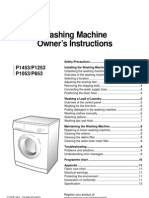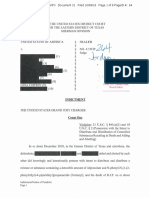0 ratings0% found this document useful (0 votes)
292 viewsImmersion Suit Servicemanual
Immersion Suit Servicemanual
Uploaded by
Sunil SadekarThis document provides instructions for donning, caring for, and inspecting immersion suits. It details the proper procedure for crew members to put on the suits, including stepping in with legs first and pulling the suit and hood up over the body. It also recommends regular practice and inspections of the suits to check for damage or missing parts and properly maintain the zippers and lights.
Copyright:
© All Rights Reserved
Available Formats
Download as PDF, TXT or read online from Scribd
Immersion Suit Servicemanual
Immersion Suit Servicemanual
Uploaded by
Sunil Sadekar0 ratings0% found this document useful (0 votes)
292 views16 pagesThis document provides instructions for donning, caring for, and inspecting immersion suits. It details the proper procedure for crew members to put on the suits, including stepping in with legs first and pulling the suit and hood up over the body. It also recommends regular practice and inspections of the suits to check for damage or missing parts and properly maintain the zippers and lights.
Original Description:
Instructions
Copyright
© © All Rights Reserved
Available Formats
PDF, TXT or read online from Scribd
Share this document
Did you find this document useful?
Is this content inappropriate?
This document provides instructions for donning, caring for, and inspecting immersion suits. It details the proper procedure for crew members to put on the suits, including stepping in with legs first and pulling the suit and hood up over the body. It also recommends regular practice and inspections of the suits to check for damage or missing parts and properly maintain the zippers and lights.
Copyright:
© All Rights Reserved
Available Formats
Download as PDF, TXT or read online from Scribd
Download as pdf or txt
0 ratings0% found this document useful (0 votes)
292 views16 pagesImmersion Suit Servicemanual
Immersion Suit Servicemanual
Uploaded by
Sunil SadekarThis document provides instructions for donning, caring for, and inspecting immersion suits. It details the proper procedure for crew members to put on the suits, including stepping in with legs first and pulling the suit and hood up over the body. It also recommends regular practice and inspections of the suits to check for damage or missing parts and properly maintain the zippers and lights.
Copyright:
© All Rights Reserved
Available Formats
Download as PDF, TXT or read online from Scribd
Download as pdf or txt
You are on page 1of 16
immersion suit
donning, care and inspection
entwurf 28.02.2006 12:18 Uhr Seite 17
Donning instructions
Time is a valuable asset in emergency cases. We recommend
practicing the donning of suits regularly for all crewmembers.
To avoid damage of suits during training, we recommend having
special training suits on board.
Open storage bag and remove the suit.
Warning: As the suits have high buoyancy, be careful not
to be trapped in submerged ship compartments.
1
entwurf 28.02.2006 12:17 Uhr Seite 2
Step in the suit with legs first. Shoes
are not required to be removed, as all
aquata suits have wide enough
trousers. Dont take off any clothing,
as additional clothing will help the
insulation of the body.
Close foot and knee tapes tightly
around the leg.
2
3
entwurf 28.02.2006 12:17 Uhr Seite 3
Pull the suit up, and place left arm
into the sleeve of suit with the free
hand. Pull the hood of the suit over
your head and slip with right arm into
the sleeve.
Pull the zipper slowly upwards and make
sure not to get any cloth between the
2 sides of the zipper. Ensure that both
sides of the open zipper are parallel. If
the slider should jam during closure DO
NOT FORCE IT! Pull back the slider;
remove the obstruction and slowly
attempt to close again. Excessive force
may break the chain. Also avoid bending
the zip excessively as this may eventually
cause the chain to break.
4
5
entwurf 28.02.2006 12:17 Uhr Seite 4
If the suit is equipped with an addi-
tional arm-zipper, close the zipper
before entering the water.
The immersion suit V20 OP needs to
be used with a lifejacket. In this case
don the lifejacket now. Take care that
the size of lifejacket can fit on top of
the suit.
6
7
entwurf 28.02.2006 12:17 Uhr Seite 5
The models V 20 and V 40 are
equipped with automatic lifejacket
lights. They activate with water con-
tact. Pulling on the small handle at
the end of the light allow to switch
the light on and off. (Other lights may
be switched off and on by turning the
light dome or push the slider)
Enter water with feet first and hold
both arms up, covering your face area.
8
9
entwurf 28.02.2006 12:18 Uhr Seite 6
normal swimming position is on
the back
entwurf 28.02.2006 12:18 Uhr Seite 7
When you are in the water
Swim if possible always on the back. Only for reaching life rafts or
other objects turn yourself.
Swimming in the breast position is by the reason of buoyancy more
difficult and will cost you more energy; further water may enter
through the face area.
As the body cools down much faster if water has entered the suit
take care to avoid all actions that may cause water to enter the
suit.
If other persons are near you in the water connect yourself to them
with the buddy line, this will increase the chance for the rescue
team to find you.
entwurf 28.02.2006 12:18 Uhr Seite 8
entwurf 28.02.2006 12:18 Uhr Seite 9
Onboard maintenance
We recommend a yearly inspection of all suits with a random
checking in between to find out if any parts missing and the quanti-
ty of functional suits comply with the quantity of crewmembers.
1. Check the condition of the bag for damage, dirt or unreadable
instructions. Check if the description outside complies with the
size and suit type inside.
2. Remove the suit from the bag and place it on a flat clean table.
Visually check the suit inside and outside of broken seams or other
damages. As the neoprene material is yellow, broken seams inside
are easy to find.
Small damages as an open seam or punctures can be repaired by
an authorized service station. Bigger damages, as burnings, torn
material, broken zippers must be repaired from the manufacturer or
specially advised service stations.
3. Check reflective tapes. Also all tapes are glued tightly to the suit,
they may damage after testing use or long time storage. We recom-
mend in this case using a service station for best adhesion and repair.
entwurf 28.02.2006 12:18 Uhr Seite 10
open seam
entwurf 28.02.2006 12:18 Uhr Seite 11
4. Check the suit for missing parts such as whistle, carbine hooks,
buddy line, wax for zipper, emergency light. Replace if necessary
only with original parts from manufacturer.
5. Check zipper area for broken seams especially at the lower end
of zipper inside the suit. Visually check the zipper for any damage
or corrosion. Remove all dirt or debris from the zipper and move
the slider a few times up and down. Lubricate the teeth of the
metal zipper outside with the wax stick. Zippers that may not work
anymore can be made movable with a silicon spray and slowly
moving the slider up and down. If the zipper is heavily corroded we
recommend a zipper change from the manufacturer or special
authorized service station. Do not use any oils which may contain
acid and damage the zipper after a while.
Special instructions for SEY neoprene zipper (without metal teeth)
Control in the inside of the suit the bottom stop of the slider. It
must be filled with about 1 cm of epoxy to prevent the slider from
damaging the neoprene. If the slider stop is lost, fill the curve area
with 1 cm of epoxy glue. Suits with a SEY zipper with a moulded
rubber slider stop at the bottom of zipper should be checked care-
fully for leakages at the end of the zipper and if necessary send
back to the manufacturer.
Generally the SEY type zipper does not need any lubrication, as
the neoprene itself is lubricated during the production process. If
entwurf 28.02.2006 12:18 Uhr Seite 12
rubber stop
entwurf 28.02.2006 12:18 Uhr Seite 13
the suit is stored long time under hot conditions we nevertheless
recommend using a silicon spray or silicon grease to make the slid-
er work easier.
6. Check all glued connections for the head pillow (only models
V20 and V40) at the suit and the pillow and the leg straps. If loose,
send suit to the next service station for repair.
7. Switch light on and off and check the validity of the light. If the
light is expired change it to a new one. We recommend using
aquata standard lights, which can be received trough our sales
network. After checking push the small automatic contact to the
belt holder at the back of the suit.
8. If the suit is dirty it can be washed with warm water and a soap
mixture. Avoid dry cleaning or chemicals for cleaning the suit as the
lining may come off if using the wrong solvents for cleaning. Dry
the suit not in direct sunshine from inside and outside. Hang it for
drying on a wide stable garment hanger until it is really dry. Do not
expose the suit to excessive heat.
9. After the checking procedure lay the suit on a flat clean table
with the zipper in opened position. Fold the arms over the breast
and roll up the suit from the leg side the head area.
entwurf 28.02.2006 12:18 Uhr Seite 14
place in storage bag
entwurf 28.02.2006 12:18 Uhr Seite 15
aquata Euras GmbH
Neuendorfstrae 23 d
D-16761 Hennigsdorf-Berlin
Tel: +49 (0)3302 - 819 84/-5
Fax: +49 (0)3302 - 819 83
www.immersionsuit.com
info@.immersionsuit.com
entwurf 28.02.2006 12:18 Uhr Seite 16
You might also like
- Washing Machine Aquacycle 400Document21 pagesWashing Machine Aquacycle 400Mandragora officinarum75% (12)
- Organic Chemistry Practice Question 0002Document11 pagesOrganic Chemistry Practice Question 0002JasonTenebroso100% (4)
- Washing Machine OK OWMDocument44 pagesWashing Machine OK OWMProjNo ratings yet
- Code of Safe Working Practices for Merchant Seafarers: Consolidated edition (incorporating amendments 1-6)From EverandCode of Safe Working Practices for Merchant Seafarers: Consolidated edition (incorporating amendments 1-6)No ratings yet
- Craftsman 16gal Wet-Dry Vac Owners ManualDocument20 pagesCraftsman 16gal Wet-Dry Vac Owners ManualElizabeth LillyNo ratings yet
- Chem 20024 - Lab No. 6 GRP ReportDocument4 pagesChem 20024 - Lab No. 6 GRP ReportOrangeIsLemonNo ratings yet
- Aquata V20 Service and Instruction Manual PDFDocument16 pagesAquata V20 Service and Instruction Manual PDFClaudiu Tudor50% (2)
- User Manual: Unitor Immersion Suit 7PDocument10 pagesUser Manual: Unitor Immersion Suit 7PPedro EscarráNo ratings yet
- WETSUITS Manual: Deep DownDocument13 pagesWETSUITS Manual: Deep DownTinus CezzNo ratings yet
- Masina de Spalat Samsung Silver NanoDocument24 pagesMasina de Spalat Samsung Silver Nanoromeo1966No ratings yet
- 4D Pouches User GuideDocument2 pages4D Pouches User GuideSamuel GleisnerNo ratings yet
- Spiromatic Face Mask and Breathing Valve User ManualDocument16 pagesSpiromatic Face Mask and Breathing Valve User Manualsaurav guleriyaNo ratings yet
- Samsung P1045 MachineDocument12 pagesSamsung P1045 Machinetamjax123No ratings yet
- User's Manual: Double-Drive Automatic Washing MachineDocument18 pagesUser's Manual: Double-Drive Automatic Washing MachineJohnNo ratings yet
- Valve Manual 2012Document2 pagesValve Manual 2012António VCNo ratings yet
- Chaleco Salvavidas PDFDocument32 pagesChaleco Salvavidas PDFknockcontrolNo ratings yet
- Vicks Humidifier v4500 ManualDocument30 pagesVicks Humidifier v4500 ManualGabe CastellanosNo ratings yet
- Washing Machine Owner S Instructions: SWF-P14 SWF-P12 SWF-P10 SWF-P8Document20 pagesWashing Machine Owner S Instructions: SWF-P14 SWF-P12 SWF-P10 SWF-P8Jelena JovicNo ratings yet
- Washing Machine EWF-E7152DWHEWF-E8152DWH-User-ManualDocument17 pagesWashing Machine EWF-E7152DWHEWF-E8152DWH-User-ManualSogi LAnonNo ratings yet
- Diving Gear Setup InstructionsDocument7 pagesDiving Gear Setup InstructionsmaustanichNo ratings yet
- Divator MKII Face Mask Instruction ManualDocument21 pagesDivator MKII Face Mask Instruction ManualDaniel Martinez BernalNo ratings yet
- Mat 12 CsDocument15 pagesMat 12 CsMatthew JonesNo ratings yet
- VM Chamber Line 40 IM ENDocument9 pagesVM Chamber Line 40 IM ENstefano.plebani.1993xNo ratings yet
- User Manual Wa82bwmecDocument24 pagesUser Manual Wa82bwmecmillajovavich100% (2)
- Assembly Instructions For The Northern Breeze:: Component ListDocument2 pagesAssembly Instructions For The Northern Breeze:: Component ListFaiz IbrahimNo ratings yet
- Shark SC630 Manual enDocument23 pagesShark SC630 Manual enkrievkalnsgNo ratings yet
- WF B1061FW 02456N 01Document20 pagesWF B1061FW 02456N 01m_mustafa774635No ratings yet
- Dyson Dc01 Owners ManualDocument6 pagesDyson Dc01 Owners ManualmagmamystNo ratings yet
- Oktober Model 7 InstructionsDocument22 pagesOktober Model 7 Instructionsabdulhakimatsh1234No ratings yet
- Wrap Up For Winter MoDocument6 pagesWrap Up For Winter MoblackestsheepNo ratings yet
- Owner'S Manual: Operating and Servicing InstructionsDocument30 pagesOwner'S Manual: Operating and Servicing InstructionsGloria García-MataNo ratings yet
- p843 ManualDocument14 pagesp843 ManualBozar TgtNo ratings yet
- Lavadora dw3610Document10 pagesLavadora dw3610jahemscbNo ratings yet
- Wfb124qwa 0Document35 pagesWfb124qwa 0remikhaledNo ratings yet
- Samsung Washing Machine ManualDocument20 pagesSamsung Washing Machine ManualMuhammad MustafaNo ratings yet
- Washing Machine Owner's Instructions: B1485AV/ B1285AV/ B1285AS/ B1285A/ B1085A/ R1285AV/ R1085A/ F1285AV/ F1085ADocument22 pagesWashing Machine Owner's Instructions: B1485AV/ B1285AV/ B1285AS/ B1285A/ B1085A/ R1285AV/ R1085A/ F1285AV/ F1085Aansingh880No ratings yet
- Manual Cuna GracoDocument60 pagesManual Cuna Gracoliron78No ratings yet
- Uputstvo Za Ves MasineDocument14 pagesUputstvo Za Ves MasineBoromiromirNo ratings yet
- Garden Pop Up Gazebo-Assembly and Instruction ManualsDocument4 pagesGarden Pop Up Gazebo-Assembly and Instruction ManualsgillerdoitNo ratings yet
- Candy Ls CSF 4570 ExDocument15 pagesCandy Ls CSF 4570 ExpanfokNo ratings yet
- WFT7000Document32 pagesWFT7000itsramNo ratings yet
- J1045a ManualDocument22 pagesJ1045a Manualx620No ratings yet
- Midea Air Dryer PDFDocument20 pagesMidea Air Dryer PDFMr DemekeNo ratings yet
- DWD Ld1411 ManualDocument32 pagesDWD Ld1411 Manualsarvaanyaa100% (1)
- Heinner HWM-M7012A Washing MachineDocument115 pagesHeinner HWM-M7012A Washing MachineromicaNo ratings yet
- LG Dishwasher ManualDocument48 pagesLG Dishwasher ManualAlbert LuimesNo ratings yet
- Electrolux EW1248W ManualDocument145 pagesElectrolux EW1248W ManualtomiklaricNo ratings yet
- Carucior Pramy LuxeDocument17 pagesCarucior Pramy LuxegiovanittaNo ratings yet
- Jenair DishwasherDocument12 pagesJenair Dishwasherjharrison9999No ratings yet
- Aw-J800aphj900dph1 Om (Eng)Document24 pagesAw-J800aphj900dph1 Om (Eng)Ah Lam (Lam Zhenhua)No ratings yet
- Kampa Filey 5 Air TentDocument6 pagesKampa Filey 5 Air TentRichardNo ratings yet
- Membrane Loading 2Document6 pagesMembrane Loading 2Rochdi KherratNo ratings yet
- Colgate Flosser User-ManualDocument10 pagesColgate Flosser User-ManualS KNo ratings yet
- PFI-DHDF - Single Bag Filter Housing Manual BookDocument4 pagesPFI-DHDF - Single Bag Filter Housing Manual Bookbennypartono407No ratings yet
- Sgu53e15au User Manual - Bosch DishwasherDocument28 pagesSgu53e15au User Manual - Bosch Dishwashergarvoo98116No ratings yet
- LG Dishwasher User ManualDocument48 pagesLG Dishwasher User ManualLee HaspersNo ratings yet
- Magic Chef Washer Manual Model Mcstcw21w2.Document39 pagesMagic Chef Washer Manual Model Mcstcw21w2.perritoxx2No ratings yet
- Hotpoint-Ariston RSG 825 JSDocument72 pagesHotpoint-Ariston RSG 825 JSAlin BalasoiuNo ratings yet
- User Guide Moto HeliteDocument76 pagesUser Guide Moto Helitet3k1llaNo ratings yet
- VS3801 V102-A Manual EnglishDocument14 pagesVS3801 V102-A Manual EnglishMariska MeiNo ratings yet
- TBS1000B User Manual 00Document174 pagesTBS1000B User Manual 00Leonardo MachadoNo ratings yet
- Building Handover Inspections ChecklistDocument7 pagesBuilding Handover Inspections ChecklistNisreen Abu-MahfouzNo ratings yet
- Axial Fans CostechDocument14 pagesAxial Fans CostechEfra BlancoNo ratings yet
- Career Teaching InterviewDocument10 pagesCareer Teaching Interviewmagpie10No ratings yet
- Ebook - FDA-approved Drugs That Interfere With Laboratory Teste PDFDocument49 pagesEbook - FDA-approved Drugs That Interfere With Laboratory Teste PDFhector zeroni100% (1)
- BernasDocument17 pagesBernasYezekael Sebastian QuintinusNo ratings yet
- Smart Walking Stick For Visually ImpairedDocument16 pagesSmart Walking Stick For Visually ImpairedAshwati Joshi100% (1)
- Shape Memory AlloyDocument8 pagesShape Memory Alloypepe_nabasNo ratings yet
- CorwinDocument8 pagesCorwinPeopleNewspapersDallasNo ratings yet
- Audi Valvelift SystemDocument56 pagesAudi Valvelift Systemc20get100% (2)
- 1.structure of BacteriaDocument12 pages1.structure of BacteriaDr P N N ReddyNo ratings yet
- Journal Pre-Proof: BioprintingDocument51 pagesJournal Pre-Proof: BioprintingWalter Ricardo BritoNo ratings yet
- Case: All Out'-Marketing A Mosquito RepellentDocument30 pagesCase: All Out'-Marketing A Mosquito RepellentHitesh RajaniNo ratings yet
- PCE Sample Questions - SET 3 (ENG)Document17 pagesPCE Sample Questions - SET 3 (ENG)Goh Koon Loong75% (4)
- TP 6101Document2 pagesTP 6101Roberto Sanchez ZapataNo ratings yet
- Fit 111 Contents and Assessments (2)Document60 pagesFit 111 Contents and Assessments (2)quentkarl8No ratings yet
- Sulphur RecoveryDocument8 pagesSulphur RecoveryprthrNo ratings yet
- Single Conductor Underground Direct Burial: Ampacity TablesDocument2 pagesSingle Conductor Underground Direct Burial: Ampacity TablesalbertoNo ratings yet
- Pelaksanaan Serta Pemantauan Evaluasi Kinerja K3 Dan Implikasinya Terhadap Kejadian Kecelakaan Kerja Di PTPN Iii Tebing Tinggi Tahun 2017Document11 pagesPelaksanaan Serta Pemantauan Evaluasi Kinerja K3 Dan Implikasinya Terhadap Kejadian Kecelakaan Kerja Di PTPN Iii Tebing Tinggi Tahun 2017Budiz AlNurNo ratings yet
- Manual Del Medidor de CampoDocument17 pagesManual Del Medidor de CampoDavisGomezNo ratings yet
- Auditory Object PerceptionDocument212 pagesAuditory Object PerceptionplbrookNo ratings yet
- Geotechnical Engineering Office, Civil Engineering and Development Department The Government of The Hong Kong Special Administrative RegionDocument16 pagesGeotechnical Engineering Office, Civil Engineering and Development Department The Government of The Hong Kong Special Administrative RegionVince KongNo ratings yet
- Expanded Carnivorous Plants by Sonixverse LabsDocument38 pagesExpanded Carnivorous Plants by Sonixverse LabsKristopher Garrett100% (3)
- Lensmaterialanddesign 161031153126Document42 pagesLensmaterialanddesign 161031153126Sayoki GhoshNo ratings yet
- Endoscopy RotationDocument4 pagesEndoscopy Rotationapi-546116329No ratings yet
- TDCV KoreaDocument6 pagesTDCV KoreaHêmânt ßânkârNo ratings yet
- TBoxMS Technical Specification 2.15Document123 pagesTBoxMS Technical Specification 2.15eftamargoNo ratings yet
- AA WivesDocument4 pagesAA WivesBj Long100% (2)

























































































